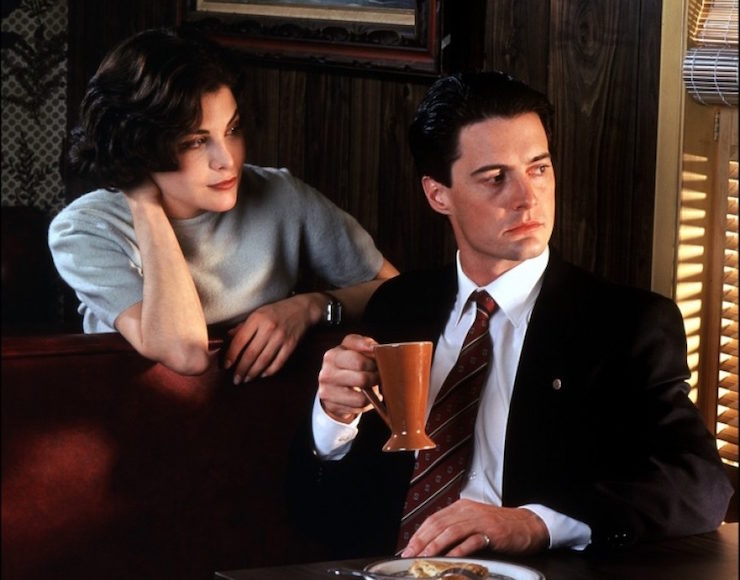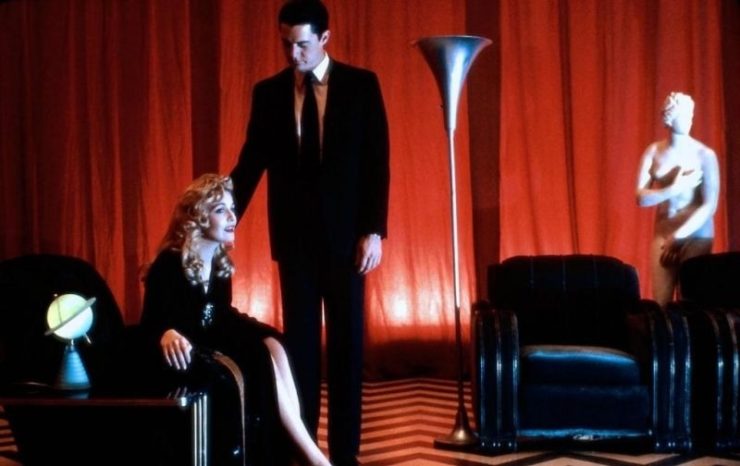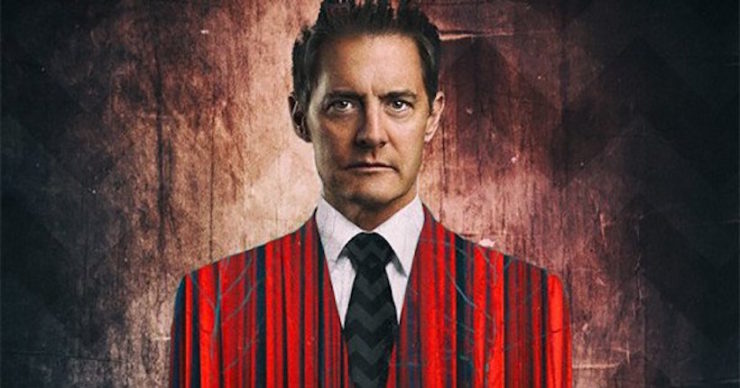Before Rust Cohle chain-smoked his way through True Detective, before Will Graham rescued his first stray on Hannibal, and before Fox Mulder made us all believe, there was one sleuth whose preternatural ability to solve a murder tinged with otherwordly implications captivated audiences around the world.
FBI Special Agent Dale Cooper was the investigator tasked with solving one of television’s most notorious crimes: the murder of homecoming queen Laura Palmer on Twin Peaks. Portrayed by a dashing young Kyle MacLachlan, who was by 1990 a David Lynch regular, having starred in the director’s Dune box office disaster and the proto-Twin Peaks noir hit Blue Velvet, Cooper was the perfect detective of his time.
Will the upcoming return to Twin Peaks give us a Cooper fit for our current darkest timeline? Well, that’s not Dale Cooper at all. But is it the Dale Cooper we deserve in 2017? A face of law enforcement we can no longer trust? A white knight who has been corrupted? A seeker of truth subsumed by a monstrous lie? I hate to feel so cynically, but absent any inkling of Twin Peaks‘ upcoming story, all I can do is examine Agent Cooper’s FBI dossier and speculate over a mug of coffee black as midnight on a moonless night.
National Geographic Channel recently re-aired a nine hour documentary called The 90s: The Last Great Decade? What’s a cable news show without extreme hyperbole and pandering to generational narcissism? That aside, X-Files creator Chris Carter brought up an interesting point. It’s hard not to see that horror in pop culture has changed after 9/11. (Think: all those scary airplanes in the pilot episodes of Fringe, Lost and FX’s The Strain.) Horror TV that closed out the millennium seems almost quaint by comparison now.
In the post-Cold War era, showrunners like Lynch and Carter looked beyond our world for an external threat. While Carter made the threat about as alien as could be, Lynch instead chose to shine a light on an evil that was not so far removed from a sleepy American town teeming with dark secrets. The homecoming queen was a cokehead and a call girl. There’s a lady whose husband’s ghost inhabits a talking log. There’s a Black Lodge in the forest where people go when they (maybe) die or just want to talk backwards and dance to smooth Angelo Badalamenti instrumentals. There’s madness, mobsters, motorcycle gangs, incest… and in this bizarro world, Canada is a land of vice.

Only an outsider like Dale Cooper can come to Twin Peaks and see things for what they truly are. Sure, any outsider might find the town more than a little strange, but Cooper has a trait that’s unique in most fiction: as teenage bombshell Audrey Horne laments, Dale Cooper is “just too perfect.”
It’s true. Dale Cooper is a symbol of complete purity of spirit and vision. Normally, this would make a character too cloying. Or worse, unbelievable. But against the backdrop of Twin Peaks, Cooper is the only person we can trust to be a moral compass.
Cooper, with his slick hair and crisp trenchcoat, is a throwback to a different gumshoe. He relies on gut instinct and luck more than forensics. While he’s one of the few non-smokers on the show, Cooper is not without vices; overindulging in cherry pie and black coffee are his trademarks. In 90s style, Coop’s an early American adopter of the Free Tibet movement and his investigative method utilizes elements of Transcendental Meditation. Hell, he even cares about Annie Blackburn (Heather Graham at her most wooden) even though no one watching the show does.
It’s been 25 years, so the statute of limitations on Twin Peaks spoilers has expired, but be warned: spoilers ahead.
Agent Cooper’s last known location was trapped in the evil Black Lodge, guiding, like a true Zen master, the tortured soul of Laura Palmer to finally escape BOB’s degradations and ascend to the White Lodge, to walk along “the path of light.” But the real Dale Cooper did not leave The Black Lodge; instead, the series villain/demon BOB possessed Cooper and is last seen using Cooper’s body as he did other, weaker men before.
This is where Twin Peaks ended, with a compromised Cooper ready to spread his evil in our world.
Cooper’s possession was one of TV’s biggest cliffhangers, never resolved in Lynch’s post-Peaks film Fire Walk With Me, which was largely a prequel. And we haven’t seen the likes of Agent Cooper since, not really. Twin Peaks has left its influence all over television — you can now see its ghost in the CW’s Riverdale, where Twin Peaks’ cutest waitress, Shelly (Madchen Amick) still serves pie — but nothing can ever be the same as the original. And that goes for the Twin Peaks revival, too.
While Lynch is returning to the hometown of Laura Palmer with series co-creator Mark Frost, the landscape of television is much changed. It’s TV’s Golden Age, when our biggest “heroes” are men that would make pure-hearted Cooper’s skin crawl: meth dealers, philandering advertising execs, mob bosses, and corrupt presidents. The closest precedent for a 90s TV revival is naturally last year’s X-Files return and that… wasn’t a good look. A ratings hit, for sure, but many critics and viewers weren’t in love with how hopelessly flat the series felt. Muddled mythology was always an issue for the long-running series, but even the jokes felt dated and Mulder and Scully’s conspiracy theories seem quaint by today’s standards.

Like Cooper in 1990, we’re entering Twin Peaks’ revival clean; press access to episodes is extremely limited, few plot points leaked. Last year’s The Secret History of Twin Peaks offered scant hints about Major Briggs’ secret military operation at the Owl Cave and a new FBI investigation, but, much like the cryptic trailers, Twin Peaks’ promotion is more about nostalgia. Will this be the story of a grimdark Dale Cooper terrorizing the small town he once loved? Or will it be the journey of Dale Cooper’s epic quest to escape the Black Lodge and get back to himself? It’s doubtful anything in a David Lynch project would ever happen in such a straight line. And with a whopping, old-school-TV order of eighteen episodes, there’s surely a lot of ground to cover.
Twin Peaks was one of the very first Internet-Era fandoms, where tech-savvy viewers could create their own Geocities sites and message boards analyzing every detail, from Log Lady musings to one-armed men. Twenty-six years on, Twitter is ready for a live-time discussion that may dominate the evening’s trending topics, at least for an hour or two. But Sunday nights are crowded with cable TV. And cable news cycles are even more packed with real-life sleepy towns’ rotten underbellies, making it harder for a TV event, even one as special as a return to Twin Peaks, to leave a lasting impression.
When we look into the Owl Cave with our new, world-weary eyes, will we find our darker selves looking back at us, or something more wonderful and strange and meaningful?
Twin Peaks: The Return begins Sunday, May 21 at 9pm E/PT on Showtime.
Sometimes Theresa DeLucci‘s arms bend back. A regular contributor to Tor.com, she’s also gotten enthusiastic about TV for Boing Boing, Wired.com’s Geek’s Guide to the Galaxy podcast and Den of Geek. Find her in The Black Lodge or on Twitter.










